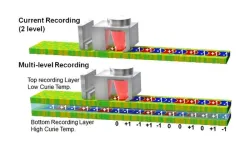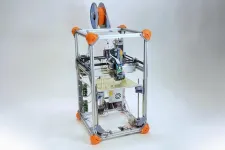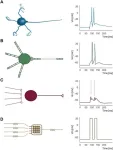(Press-News.org) SAN DIEGO – A combination of the KRASG12C inhibitor adagrasib (Krazati) and the anti-epidermal growth factor receptor (EGFR) antibody cetuximab (Erbitux) showed clinical activity and promising survival outcomes in a cohort of patients with metastatic, heavily pretreated, KRASG12C-mutated colorectal cancer, according to results from the phase I/II KRYSTAL-1 trial presented at the American Association for Cancer Research (AACR) Annual Meeting 2024, held April 5-10.
The study was simultaneously published in Cancer Discovery.
KRASG12C mutations occur in around 4% of colorectal cancers and are associated with a poor prognosis. Drugs targeting KRASG12C, such as adagrasib, have emerged in recent years but are currently only approved by the U.S. Food and Drug Administration (FDA) to treat non-small cell lung cancer.
“Treatment options are limited for previously treated patients with KRASG12C-mutated colorectal cancers,” said Scott Kopetz, MD, PhD, a professor of Gastrointestinal Medical Oncology and associate vice president of Translational Integration at The University of Texas MD Anderson Cancer Center. “Although there is some encouraging single-agent activity of adagrasib in KRASG12C-mutated colorectal cancer, it is important to continue finding ways to mitigate resistance.”
Preclinical evidence has shown that cancer cells can develop resistance to KRASG12C inhibition by upregulating EGFR activity, Kopetz explained. EGFR can drive tumor growth through the same molecular pathway that includes KRAS.
“Preclinical work combining a KRASG12C inhibitor with an EGFR inhibitor showed that we could mitigate adaptive resistance,” Kopetz said. “In the KRYSTAL-1 trial we sought to evaluate this in patients.”
KRYSTAL-1 is a multiple expansion cohort phase I/II trial testing the safety and efficacy of adagrasib alone or in combination with other anticancer therapies in patients with advanced solid tumors that harbor a KRASG12C mutation. In the presented study, Kopetz and colleagues examined the use of adagrasib plus the EGFR inhibitor cetuximab in 94 patients with metastatic, KRASG12C-mutated colorectal cancer enrolled in either phase of the trial.
The objective response rate (the primary endpoint) was 34%, and the disease control rate was 85.1%; responses lasted a median of 5.8 months. The median progression-free survival was 6.9 months, and the median overall survival was 15.9 months.
While the study was not designed to compare the outcomes of patients treated with adagrasib plus cetuximab to those of patients treated with adagrasib monotherapy, Kopetz said the combination performed favorably compared to historical data. For instance, adagrasib monotherapy has been observed to have response rates around 20% in similar cohorts, compared to the 34% observed here, he explained.
The combination therapy was well tolerated, Kopetz noted, with treatment-related adverse events of grade 3 or higher occurring in 27.7% of patients. Adverse events led to adagrasib dose reduction in 29.8% of patients.
Kopetz noted that the combination is currently under priority review by the FDA for this indication. Kopetz and colleagues are exploring the efficacy of the regimen further in the phase III KRYSTAL-10 trial, which compares adagrasib plus cetuximab to standard-of-care chemotherapy in the second line of treatment for metastatic, KRASG12C-mutated colorectal cancer.
“Adagrasib plus cetuximab may be a potential new standard of care for patients with previously treated, KRASG12C-mutated colorectal cancer,” Kopetz said. “Our study builds upon the progress made with KRASG12C inhibitors and underscores the importance of ongoing research to refine and expand treatment options for patients with colorectal cancer.”
Limitations of this study include its single-arm, open-label design.
This study was funded by Mirati Therapeutics. Kopetz reports ownership interests in Lutris Pharma, Iylon Precision Oncology, LLC, Frontier Medicines, Xilis Inc., and Navire Pharma. He serves as a consultant for Genentech/Roche, EMD Serono Inc., Merck, Holy Stone Healthcare, Novartis, Eli Lilly and Company, Boehringer Ingelheim, AstraZeneca/MedImmune, Bayer Health, Redx Pharma, Ipsen, HalioDx, Lutris Pharma, Jacobio Pharmaceuticals Group Co. Ltd., Pfizer, Repare Therapeutics, NeoGenomics Laboratories/Inivata, GSK, Jazz Pharmaceuticals, Iylon Precision Oncology, LLC, Xilis Inc., AbbVie, AMAL Therapeutics, Gilead Sciences, Mirati Therapeutics, Flame Biosciences, Servier Pharmaceuticals, Carina Biotech, Bicara Therapeutics, Endeavor BioMedicines, Numab Therapeutics AG, Johnson & Johnson/Janssen Pharmaceuticals, Genomic Health, Frontier Medicines, Replimune, Taiho Pharmaceutical, Cardiff Oncology, Ono Pharmaceutical, Co. Ltd., Bristol Myers Squibb/Medarex, Amgen, Tempus, Foundation Medicine, Harbinger Health, Takeda Pharmaceuticals, Cureteq AG, Zentalis Pharmaceuticals, Blackstone Therapeutics, Accademia Nazionale di Medicina, and Tachyon Therapeutics, Inc. Kopetz reports funding from Sanofi, Biocartis, Guardant Health, Array BioPharma, Genentech/Roche, EMD Serono Inc., AstraZeneca/MedImmune, Novartis, Eli Lilly and Company, and Daiichi Sankyo.
END
Adagrasib plus cetuximab may provide clinical benefit in patients with KRASG12c-mutated colorectal cancer
2024-04-08
ELSE PRESS RELEASES FROM THIS DATE:
Next-generation PARP inhibitor demonstrates clinical benefit in patients with homologous recombination repair-deficient breast cancer
2024-04-08
SAN DIEGO – Saruparib, a selective inhibitor of poly-ADP ribose polymerase 1 (PARP1), demonstrated a promising objective response rate and progression-free survival in patients with certain homologous recombination repair (HRR)-deficient breast cancers, according to results from the phase I/II PETRA trial presented at the American Association for Cancer Research (AACR) Annual Meeting 2024, held April 5-10.
Although blocking the enzyme PARP1 may be sufficient to prevent DNA repair in HRR-deficient tumors, all PARP inhibitors currently approved by the ...
An exosome-based liquid biopsy shows promise for early detection of pancreatic cancer
2024-04-08
SAN DIEGO – An investigational exosome-based liquid biopsy accurately detected 97% of stage 1-2 pancreatic cancers when combined with the biomarker CA 19-9, according to research presented at the American Association for Cancer Research (AACR) Annual Meeting 2024, held April 5-10.
“Pancreatic cancer is one of the most fatal malignancies, in large part because the majority of patients are diagnosed only after the cancer has already metastasized,” said Ajay Goel, PhD, senior author of the study and the chair of the Department of Molecular ...
Proof-of-principle demonstration of 3-D magnetic recording
2024-04-08
1. Research groups from NIMS, Seagate Technology, and Tohoku University have made a breakthrough in the field of hard disk drives (HDD) by demonstrating the feasibility of multi-level recording using a three-dimensional magnetic recording medium to store digital information. The research groups have shown that this technology can be used to increase the storage capacity of HDDs, which could lead to more efficient and cost-effective data storage solutions in the future.
2. Data centers are increasingly storing vast amounts of data on hard disk drives (HDDs) that use perpendicular ...
This 3D printer can figure out how to print with an unknown material
2024-04-08
While 3D printing has exploded in popularity, many of the plastic materials these printers use to create objects cannot be easily recycled. While new sustainable materials are emerging for use in 3D printing, they remain difficult to adopt because 3D printer settings need to be adjusted for each material, a process generally done by hand.
To print a new material from scratch, one must typically set up to 100 parameters in software that controls how the printer will extrude the material as it fabricates an object. Commonly ...
Brain-inspired computing may boil down to information transfer
2024-04-08
The biological brain, especially the human brain, is a desirable computing system that consumes little energy and runs at high efficiency. To build a computing system just as good, many neuromorphic scientists focus on designing hardware components intended to mimic the elusive learning mechanism of the brain. Recently, a research team has approached the goal from a different angle, focusing on measuring information transfer instead. Their method went through biological and simulation experiments and then proved effective in an electronic neuromorphic system. It was published ...
Youths with mood disorders 30 percent less likely to acquire driver’s license than peers
2024-04-08
Philadelphia, April 8, 2024 – Researchers from Children’s Hospital of Philadelphia (CHOP) found that teens and young adults with mood disorders, such as depression and bipolar disorder, were 30% less likely to obtain their driver’s license than peers without such disorders. Additionally, those youths with mood disorders experienced a slightly elevated risk of crashing. These findings suggest that these teens and young adults could benefit from guidance on obtaining licensure and accessing training to avoid crashes when they are newly licensed.
The findings were published online today ...
Opening a new front against pancreatic cancer
2024-04-08
NEW YORK, NY (April 8, 2024)--A new type of investigational therapeutic in development for pancreatic cancer has shown unprecedented tumor-fighting abilities in preclinical models of the disease, suggesting it has the potential to offer novel treatment options for nearly all pancreatic tumors, a comprehensive study has found.
The inhibitors in this new class of oral medications, being developed by Revolution Medicines Inc., target the oncogenic or active cancer-causing form of RAS proteins (such as KRAS, NRAS, and HRAS). These RAS “oncoproteins” drive up to a third of all human cancers. The research ...
More premature babies born following Swedish parental leave policy
2024-04-08
The introduction of a policy protecting parental leave benefits in Sweden in 1980 had unintended consequences on child health. The policy led to an increase in premature birth rates. This is shown by a study from researchers at Stockholm University, published in JAMA Pediatrics.
The Swedish so-called speed premium policy was introduced in 1980 in order to protect couples’ level of income-based parental leave benefits when they had children in quick succession. The new study from Stockholm University evaluates the health consequences of the policy. The researchers conclude that by ...
Immune key to chronic viral infections discovered
2024-04-08
IMMUNE KEY TO CHRONIC VIRAL INFECTIONS DISCOVERED
Australian researchers have discovered a previously unknown rogue immune cell that can cause poor antibody responses in chronic viral infections. The finding, published today (9 April) in the journal, Immunity, may lead to earlier intervention and possibly prevention of some types of viral infections such as HIV or hepatitis.
One of the remaining mysteries of the human immune system is why a certain cell, called a B cell, which retains a memory for past infections – ensuring we fight off diseases we have experienced before – often only has a weak capacity to protect us from persistent infections.
Researchers ...
PFAS ‘forever chemicals’ above drinking water guidelines in global source water
2024-04-08
Per-and poly-fluoroalkyl substances – commonly known as PFAS – are a group of over 14,000 human-made chemicals that have been popular since the 1950s for their diverse skills in resisting heat, water, grease and stains.
They’ve been commonly found in household products like non-stick frypans, clothing, cosmetics, insecticides, and food packaging, as well as specialty industry products, like firefighting foam.
But despite their broad skillset, the chemicals have a dark side: they’re known as ‘forever chemicals’ as once they’re in the environment – ...


